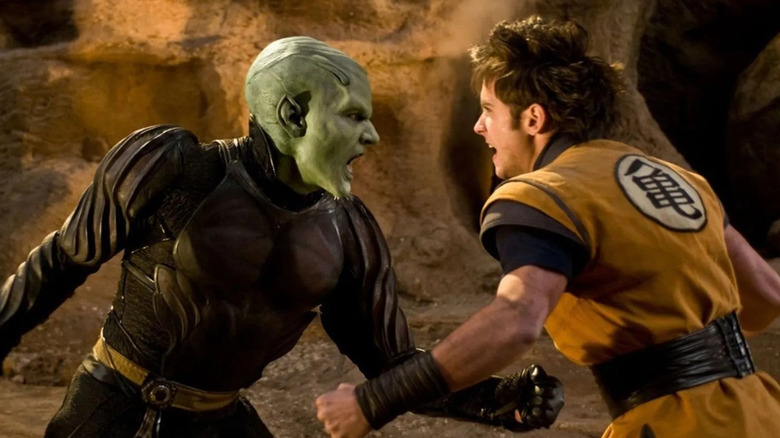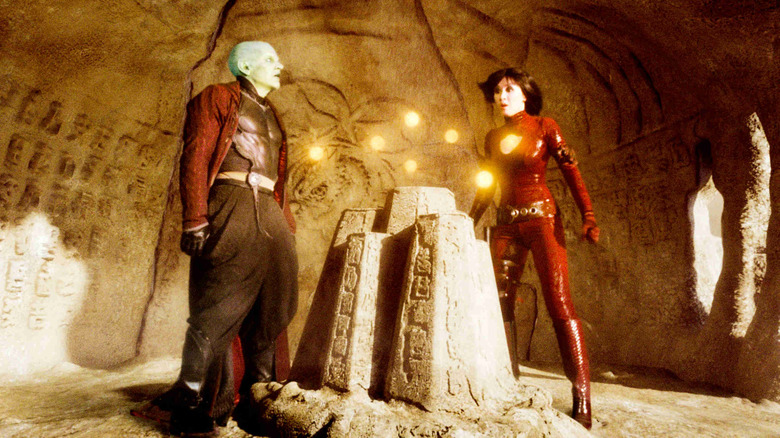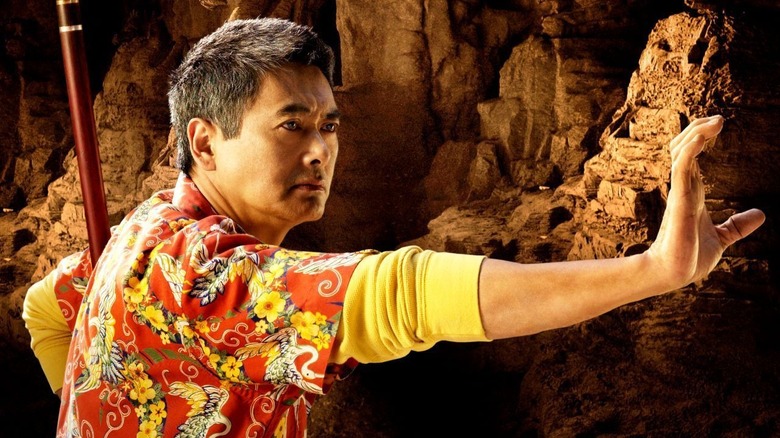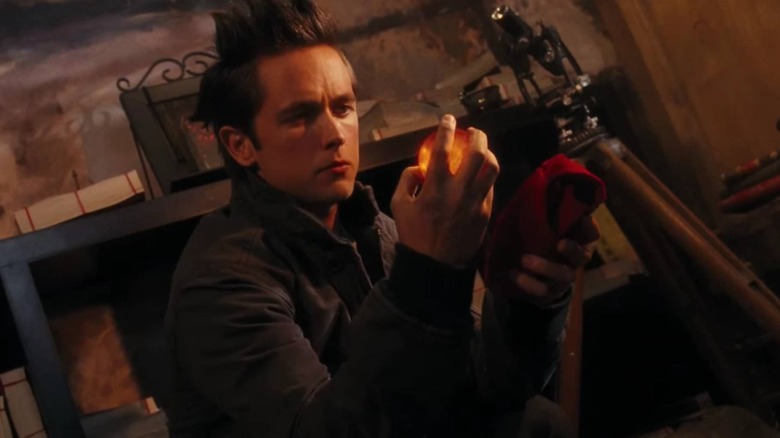James Marsters Knew Dragonball Evolution Was Doomed From His First Day On Set
The "Dragon Ball" media empire began with Akira Toriyama's manga, first published in 1984. In 1986, the manga was adapted into an anime TV series which ran until 1997, was rebooted from 2009 to 2011, had a TV special in 2013, and then had another solid run from 2014 to 2018. This is to speak nothing of the 20 Japanese feature films based on the anime. With so much mileage to work with, the mythology of "Dragon Ball" is vast and incomprehensible to the outsider.
Briefly, "Dragon Ball" follows a character named Goku and his quest to gather seven Dragon Balls, mystical orbs of immense power. Over the course of the series, Goku will train with deities, have explosive fights with space aliens, battle Super Saiyan, and trip along the multiverse. In the United States, the "Dragon Ball" TV shows became a regular staple of Saturday morning animation blocks in the 1990s, and a generation of youths were raised on the show's hyperkinetic, nonsensical action.
In 2009, 20th Century Fox secured the live-action film right to "Dragon Ball," and proceeded to make "Dragonball Evolution," a film made by James Wong ("Final Destination," "The One"), and starring Chow Yun-Fat, Emmy Rossum, Jamie Chung, and Justin Chatwin as Goku. The role of King Piccolo, the green-headed villain, went to James Marsters, best known for playing the vampire Spike on "Buffy the Vampire Slayer." Marsters also performed the English language dialogue for Zamasu in the "Dragon Ball" animated shows.
"Dragonball Evolution" was roundly rejected by pretty much everyone, critics and fans alike, lambasted for its cheapness, and is regularly featured on snarky comedic criticism channels like Honest Trailers. Its reputation now precedes it. At the 2014 Wizard World Convention in Atlanta, Marsters pointed out that the production was having problems from the very start.
The $120 million version that didn't exist
At Wizard World, Marsters talks frankly and openly about how much "Dragon Ball" meant to him as a father; he explains that a character like Goku is not a violent soldier, but a protector who only becomes enraged and violent if his family is threatened. Making a "Dragon Ball" movie was a way for Marsters to reach out to younger kids (his own son was about 12 when "Evolution" was in production). And the film he signed on to make sounded amazing: It was to be produced by the legendary Stephen Chow, and the budget was to be in the realm of $120 million. Marsters was under the impression "Evolution" was to be a massive A-list movie. As it turns out, that wasn't so.
"'Dragon Ball Z' was important for me as a father, so I was really into it when I got the role. And they told me it was a $120 million picture, and that Stephen Chow was producing. And Stephen Chow is the director of 'Kung Fu Hustle' and 'Shaolin Soccer.' Which if you guys haven't seen his films, go get them, just fabulous. They're funny, goofy, violent, scary: Everything you would need for Dragon Ball to work.
But then, Marsters was hoodwinked.
"And I get out to Durango, Mexico and it's a $30 million picture and Stephen Chow is just on paper to fool us down into the desert. And they don't even want to pay for the stuntman to get made up like me, so they never used the stuntman; they just kept putting me up on wires. I still have a separated clavicle from the shoot, because it was just gnarly. But I still wanted my son to at least like my part in it."
The crowded theater
When it comes to adapting a property like "Dragon Ball" — that is, something with a massive fan base, but little cultural traction outside its closest followers — accuracy to the source material seems to be key. While 20th Century Fox clearly wanted to make a version of "Dragon Ball" that would have crossover appeal and resemble other hit movies, in so doing, they abandoned a lot of details that made the show appealing to its fan base. As such, it was roundly rejected. Marsters talked about how his hopes ran high that crowds would accept it ... and the horror of finding it rejected:
"So this is the funny ending to it. So, it comes out, and I wanted to hit, because frankly we get three pictures out of it if it hits, and we get another chance to do it again, and then we get to do 'Dragon Ball Z' material, and my character is going to transform into the Piccolo that we all know. Because I was doing King Piccolo, so I wanted to ... I wanted to pump out and be Piccolo and surprise everybody."
The opening night was promising, as Marsters entered a full theater full of enthused fans, waiting to see the action.
"And so, my son was all excited about the movie, and so we go into the Cineplex, and he leads us into the theater, and I'm like, 'Please man, full house, opening night,' and we walk in there and it's packed. It smells like body odor, beautiful. And it's hard to get three seats together, my daughter, my son and I, and we get three seats together and I'm so excited. Something in my brain goes off like, 'This is too good to be true.'"
As the axiom goes, if something seems too good to be true, it probably is.
This is Fast & Furious, man
The saddest part of the story lies ahead, as Marsters slowly came to realize the truth about that packed, armpit-scented movie theater:
"And I lean over to the teenager next to me and say, 'Is this Dragon Ball?' and he goes, 'What?' and I go, 'Is this Dragon Ball?' And he goes, 'What? No! This is 'Fast & Furious,' man!' So we get up, and we go across the hall to 'Dragon Ball'; my son was so excited he led us into the wrong theater. And I'm thinking, 'Please man, just 50 people.' And we walk in there, and including us three, there's five people in the audience."
That opening night was indicative of things to come. The $30 million production had a $4 million opening on Easter weekend in 2009, eventually scraping in a scant $9.3 million domestically. As mentioned, "Evolution" was not embraced by fans, and was soon relegated to the ash heap. Akira Toriyama would later say on the event of "Dragon Ball's" 30th anniversary that he had meant to retire from the title, but the live-action movie was so bad, he had to return to wash the bad taste out of everyone's mouths. In 2016, the film's screenwriter, Ben Ramsay, openly apologized to "Dragon Ball" fans for what he made.
Sequel plans were scrapped and "Dragon Ball" anime became the center of the franchise once again. Fans will always have the original, luckily, and can look to Wong's feature film as a mere hiccup in an otherwise beloved media franchise.



